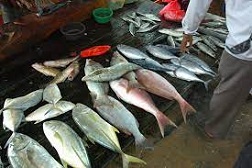WTO members on Tuesday engaged in intense discussions to get closer to meaningful outcomes on fisheries subsidies and agriculture at the 13th Ministerial Conference (MC13) in Abu Dhabi.
Ministers participated in dedicated meetings on both issues followed by convergence-building sessions to seek to bridge the remaining gaps. Members also endorsed the entry into force of new disciplines on services domestic regulation and advanced work on plastics pollution, fossil fuel subsidy reform, and environmental sustainability.
The first working session at MC13 was dedicated to fisheries subsidies. The facilitator of the negotiations, Iceland’s Permanent Secretary of State Martin Eyjólfsson, said the working session and the convergence-building session were productive and commended members for their constructive and focused participation.
He said he will reach out to members to schedule a series of bilateral consultations on Wednesday, the third day of the Conference, and will share drafts for a Ministerial Decision and the protocol for the adoption by the Ministerial Conference of the Additional Provisions on Fisheries Subsidies.
“I firmly believe that success is within reach. If we operate with the right will, we will find the way. Let’s keep up the momentum,” he said.
While many members reiterated their existing positions on the second wave of fisheries negotiations, there were signs of willingness to compromise. Several delegations noted the short time remaining and urged colleagues to engage in bridge-building.
The working session started with the Philippines presenting its instrument of acceptance of the Fisheries Subsidies Agreement. Following the wave of acceptances at the MC13 opening ceremony — presented by Brunei Darussalam, Chad, Malaysia, Norway, Rwanda, Saudi Arabia, Togo and Türkiye — the Philippines brought the total number of members accepting the Agreement to 70 (meaning 40 acceptances remain for the entry into force of the Agreement).
On agriculture, members addressed three critical areas: the balance across topics in terms of the specificity of issues to be addressed, timelines and expected outcomes; the deliverables for most vulnerable members in respect of the possible exemption of their imports from other members’ export restrictions ; and public stockholding (PSH) for food security purposes.
The facilitator for agriculture, Rebecca Miano, Cabinet Secretary at the Ministry of Investments, Trade and Industry of Kenya, said members agreed on the critical importance of reaching an outcome at MC13, which would provide a clear sense of direction for future negotiations. Many members stressed the importance of agreeing on deliverables at MC13, but views continued to differ on how these shared objectives may be achieved.
The facilitator expressed her intention to convene meetings in various configurations on Wednesday and invited delegations to consult among themselves and explore the possibility of narrowing gaps and tabling compromise proposals. “With less than 48 hours left, all members will need to make the necessary compromises that would enable us to make progress on the outstanding issues and reach an outcome on agriculture,” she said.
The thematic sessions were followed at the end of the day by a meeting of Heads of Delegations, where the WTO Director-General Ngozi Okonjo-Iweala thanked members for their constructive engagement on all areas of discussion. However, she stressed that it is “crunch time” with only two days left until the official conclusion of MC13. “Everyone wants to leave on time, but if we do not get results, we are not leaving!” she added.
Director-General Okonjo-Iweala also referred to the ministerial conversations held on the first day of the Conference to address two issues: trade and sustainable development, including trade and industrial policy and policy space for industrial development, and trade and inclusion. She noted that these deliberative sessions, held for the first time at MC13, need to be finetuned but highlighted the appetite expressed by members to continue engaging in this format in the future.
Day Two of the Ministerial Conference also saw the entry into force of new disciplines on services domestic regulation, which is expected to lower trade costs by over USD 125 billion worldwide. Supported by 72 WTO members, the Joint Initiative on Services Domestic Regulation is designed to facilitate services trade by streamlining and simplifying regulatory procedures and thereby lowering trade costs. It includes the first-ever commitment in a WTO agreement to ensuring non-discrimination between men and women when they seek permits to supply services.
On the Trade and Environmental Sustainability Structured Discussions (TESSD), 76 participating members unveiled a package of outcomes highlighting advances made in the discussions since the 12th Ministerial Conference (MC12) in June 2002 and pinpointing future action in trade policy.
On the Dialogue on Plastics Pollution and Environmentally Sustainable Plastics Trade (DPP), a ministerial statement circulated by the six co-coordinators — Australia, Barbados, China, Ecuador, Fiji and Morocco — outlined trade-related actions to address the environmental, health and economic impacts of plastics pollution.
On the sidelines of the Conference, Director-General Okonjo-Iweala met members of her Civil Society Advisory Group to exchange views on the role of trade and how the WTO can evolve to meet current challenges facing the world.

